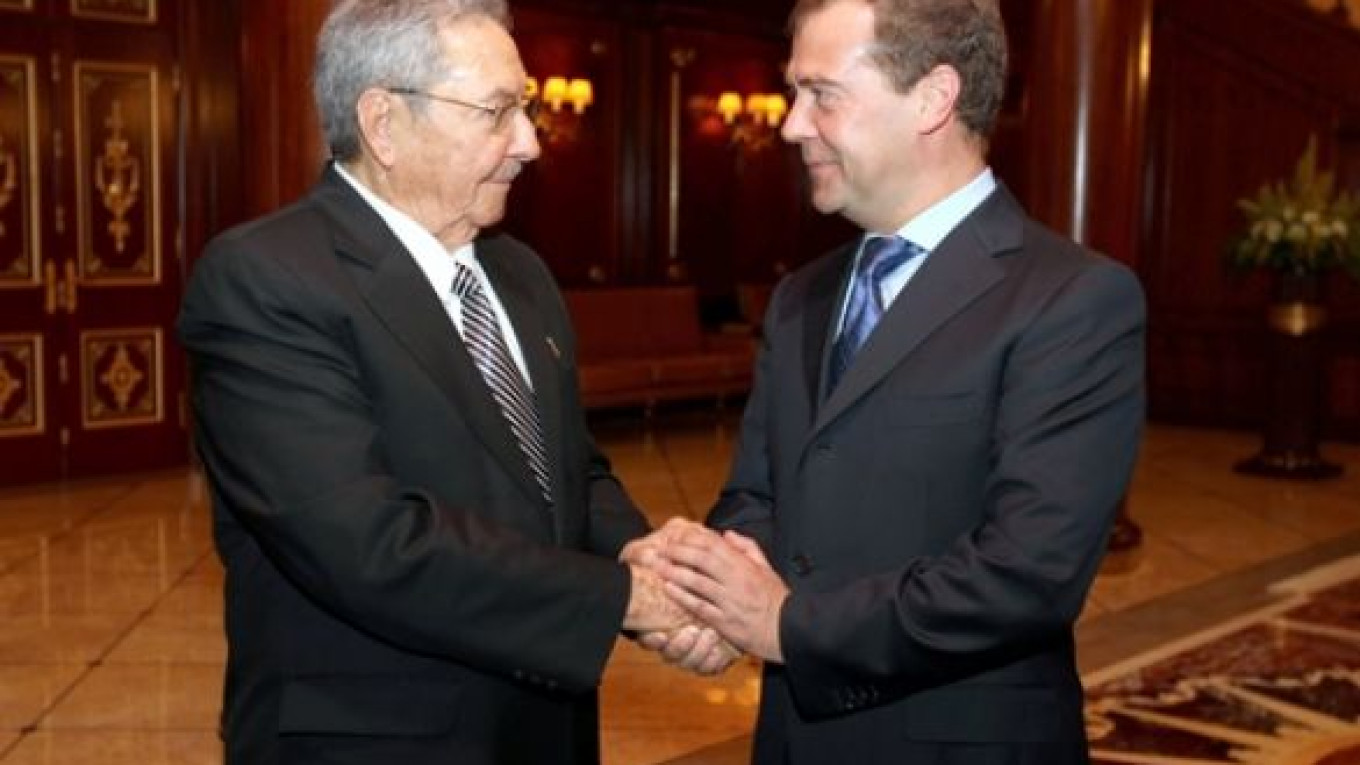HAVANA — Should Prime Minister Dmitry Medvedev stop by the venerable Hotel Nacional during his visit to Havana this week, he might take note of an ironic composition in the lobby.
A small advertisement proudly proclaims Cuba as the site of "the greatest confrontation between the United States and the Soviet Union" and beckons visitors to tour the trenches and tunnels on the hotel's grounds that were used during the Cuban missile crisis more than 50 years ago.
Also in the lobby on an afternoon this week were a throng of mostly elderly American tourists, visiting legitimately despite a half-century U.S. embargo thanks to a limited number of so-called cultural exchanges.
The group seemed oblivious to a large contingent of Russians in Medvedev's advance team.
Although certainly more lightly and informally dressed than they might be while preparing for a state visit in many other countries, the Russian officials were involved in a range of meetings taking place around Medvedev's two-day visit, which starts Thursday and will include talks between the prime minister and Cuban leader Raul Castro.
A meeting with older brother Fidel is possible "if his doctor allows it," a member of the Russian delegation told Interfax.
"We are thankful for the attention," said one local business executive, who like other Cubans interviewed for this story insisted on anonymity, saying he did not want to draw undue attention to himself. "After all, we have to work closely with our important international friends, no matter how far away they are."
Seven intergovernmental documents are expected to be signed during Medvedev's stay, including an agreement on cooperation in space research and a memorandum on mutual understanding between Rosatom and the Cuban national nuclear safety center, RIA-Novosti reported. A deal might also be clinched for Ilyushin Finance to supply An-158 regional jets to Cuban operators, Interfax reported.
The main focus of the Russian-Cuban talks is expected to be bilateral trade, which totaled a mere $194.9 million for the first 11 months of 2012. Havana and Moscow agreed to try to expand and diversify commercial relations during Raul Castro's visit to Moscow last July.
Cubans are hoping that small figure will increase drastically if Russia's overseas oil company Zarubezhneft finds oil when it completes drilling that it began in December off Cuba's northwestern coast. If oil is found when the first stage of drilling is complete in June 2013, investment in the project could reach 5 billion euros ($6.7 billion), according to a company statement.
The Cuban government has said that up to 20 billion barrels of oil could be under the seafloor. But disappointment swept the island three times over the past two years as previous test drills by other foreign firms came up dry.
Raul Castro and Medvedev, who will arrive after a visit to Brazil, may also discuss the situation in Venezuela, which like Cuba has been a long-time, loyal ally of Moscow. Venezuelan President Hugo Chavez left Cuba for home this week after an extended stay for cancer treatment, and the gravity of his illness remains unclear. ?
Although not listed on the official agenda for Medvedev's visit, Cuba could benefit from best practices sharing as it ramps up efforts to promote private enterprise similar to those introduced by the Soviet government in the late 1980s. Cubans are beginning to learn the joys and sorrows of individual enterprise as Raul Castro follows through on a government initiative started nearly two years ago to push 1 million state employees off the official payroll and into a burgeoning private sector. The new rules allow for more private ownership of homes, cars, businesses and even involves providing microloans.
"You can see the changed landscape of the city," said a local resident, in reference to the expanding number of kiosks, stands and makeshift storefronts where newly registered individual entrepreneurs are hawking foodstuffs, clothing and small goods. They are beginning to open service establishments like beauty parlors and mini health spas, in addition to adding to an existing base of private restaurants. A recent trend has small local bars appearing in neighborhoods across the city.
The number of Russian tourists is also booming, with 87,000 visiting the island in 2012 compared to 78,500 the previous year. The Cuban government has said it expects tourism from Russia to double over two years. It could well be that some of those visitors, who represent Russia's own growing middle class, have experience in entrepreneurship to share.
Contact the author at j.lifflander@imedia.ru
Related articles:
A Message from The Moscow Times:
Dear readers,
We are facing unprecedented challenges. Russia's Prosecutor General's Office has designated The Moscow Times as an "undesirable" organization, criminalizing our work and putting our staff at risk of prosecution. This follows our earlier unjust labeling as a "foreign agent."
These actions are direct attempts to silence independent journalism in Russia. The authorities claim our work "discredits the decisions of the Russian leadership." We see things differently: we strive to provide accurate, unbiased reporting on Russia.
We, the journalists of The Moscow Times, refuse to be silenced. But to continue our work, we need your help.
Your support, no matter how small, makes a world of difference. If you can, please support us monthly starting from just $2. It's quick to set up, and every contribution makes a significant impact.
By supporting The Moscow Times, you're defending open, independent journalism in the face of repression. Thank you for standing with us.
Remind me later.


